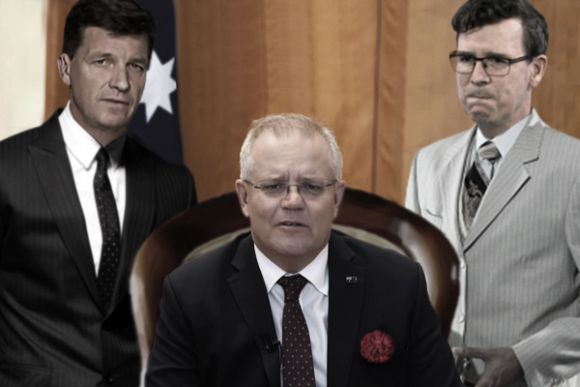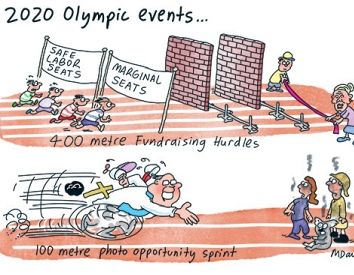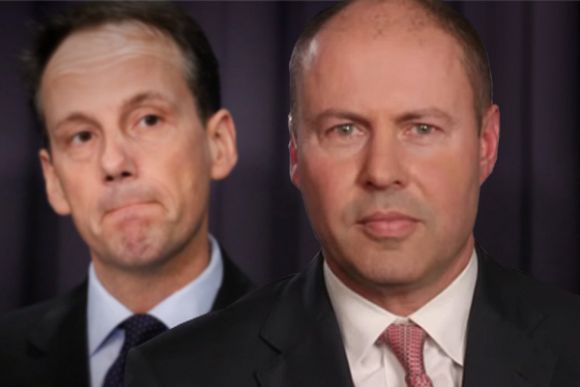The Federal Government has never been so corrupt, writes Richard Gillies.
THE LIST OF corrupt decisions that the Liberal-National Coalition has made is 124 items long and growing. In all but a few cases, there have been no consequences for offending members of the Government.
The mainstream media frequently portray this as a modern phenomenon with the implication that a Labor federal government would similarly escape consequences for corruption. The torching that former Senator Sam Dastyari received from the mainstream media after accepting a $44,000 donation from a Chinese businessman emphatically refutes that notion.
The purpose of the current Federal Government is to enrich its donors
Some of the most egregious recent cases of Federal Government corruption include the following.
Former leader of the National Party, Barnaby Joyce, approved an $80 million purchase of water from a company, Eastern Australia Agriculture, established by the Minister for Energy and Emissions Reduction, Angus Taylor. A large stakeholder in that company is a longtime friend of Angus Taylor’s.
Not only is this a conflict of interest, but it was also later found that the water was practically worthless.
The Government purchased land at Leppington Triangle for $30 million from a family that had donated to the Liberal Party. The true value of this land was $3 million.
The Government also awarded a $1.4 billion contract to a company, Canstruct, to run an offshore asylum seeker processing facility, despite there being no arrivals of asylum seekers to the facility since 2014. The company is also a donor to the Liberal Party.
The Coalition Government has spent more than a billion dollars on travel contracts with a company, Helloworld!, whose CEO was the treasurer of the Liberal Party.
The government similarly awarded $70 million worth of contracts for a cashless welfare card program to a company, Indue, whose former deputy chairman was a member of parliament for the National Party. He still has a substantial stake in the company.
Former MP Andrew Robb started a job paying $880,000 per year with a Chinese company while still a member of Parliament. He had this position for over two years, meaning his total remuneration was more than $1.7 million.
A purported agent of influence
If the volume of media coverage is a guide to how heinous an instance of corruption is, Sam Dastyari accepted $44,000 donation from a Chinese Company was the worst of all.
Below is a graph representing the number of articles that mention these stories that have been published in Australia’s media.
The amount of attention that Sam Dastyari received from Australia’s media is disproportionate in two ways.
Firstly, the amount of money he received from his donation was miniscule in comparison to the amount Andrew Robb received. In total, Andrew Robb received more than $1.7 million, while Sam Dastyari received $44,000. Despite this, Sam Dastyari’s wrongdoing received more than nine times as much coverage by Australia’s media.
Secondly, unlike the instances of Coalition corruption listed above, the donation that Sam Dastyari cannot conceivably be linked to any government decisions. The Labor Party has not awarded a million-dollar contract, or sold a port, to the company that donated money to Sam Dastyari.
How the banks shape Australia’s media coverage
Investigative journalist, Anthony Klan, who previously worked for The Australian, recently provided evidence to the Senate Media Diversity Inquiry wherein he described how a story that he had written about Westpac’s superannuation scheme was suppressed.
Mr Klan found that Westpac had ripped off billions of dollars from hundreds of thousands of their customers.
Just before the story was due to be printed, Klan was called into a meeting with senior editors of The Australian and several Westpac executives. During this meeting, Mr Klan learned that The Australian would not be publishing his story.
Klan proffered that Westpac threatened to reduce the amount of money that they were spending on advertising with The Australian. Australia’s banks are a major source of income for Australian media companies through their advertising spend. Any decrease in advertising spend by a bank would impact the profitability, and perhaps the survival, of an affected publication.
If Australia’s media companies decide what is, and is not, published depending on how much income they receive from the major banks in exchange for advertising, why wouldn’t they excessively report on wrongdoing by Sam Dastyari, the Senator that regularly called for the Financial Services Royal Commission?
Conversely, in order to ensure their own profitability, Australian media companies would be wise to refrain from reporting on corruption committed by politicians that voted against that Royal Commission in excess of 20 times.
Because of their mutual allegiances to Australia’s banks and other corporations, Australia’s largest media companies are tolerant of the conduct of the most corrupt Federal Government in Australia’s history.
Coalition politicians escaping penalties for gifting tens of billions of dollars to themselves, donors, friends and family has nothing to do with the excuses that that mainstream media offer for not doing their job, such as the "electorate being disengaged" or "today's fast-paced media cycle".
The case of Sam Dastyari proves that the media still can swiftly end a politician’s career for an indiscretion, if they choose to.
Richard Gillies is a scientist. You can follow Richard on Twitter @RichardJGillies.
Related Articles
- The Coalition's debt far outstrips Labor's
- Morrison Government makes life even harder for struggling Australians
- ALAN AUSTIN: Treasurer Frydenberg's spurious pre-election claims
- ALAN AUSTIN: Australia's low infrastructure spend, despite record debt
- ALAN AUSTIN: Another year of disastrous construction worker deaths recorded
 This work is licensed under a Creative Commons Attribution-NonCommercial-NoDerivs 3.0 Australia License
This work is licensed under a Creative Commons Attribution-NonCommercial-NoDerivs 3.0 Australia License
Support independent journalism Subscribe to IA.















